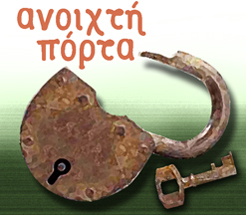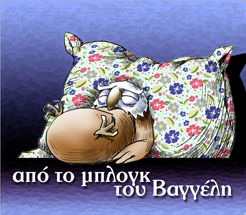

Αν ήταν δυνατόν να ζυγίσει κανείς ένα όνομα θα έλεγα πως το πιο βαρύ στον κόσμο της μουσικής είναι το Ludwig Van Beethoven. Κι αν ήταν να το προφέρει με μουσική υπόκρουση -τις πρώτες μπάρες της 5ης, ας πούμε- το όνομα γίνεται πια ασήκωτο.
Η σχέση του Μπετόβεν με το φαγητό, γιατί γι αυτό θα μιλήσουμε, ήταν περίεργη. Όπως και στην μουσική του όλα έπρεπε να είναι τέλεια μέχρι κεραίας. Ο καφές του, ας πούμε, το μόνο αναπόσπαστο μέρος της δίαιτάς του, έπρεπε να είναι φτιαγμένος για κάθε φλυτζάνι με εξήντα (60) κόκκους φρεσκοκαβουρδισμένου καφέ που τους μετρούσε ο ίδιος έναν έναν. Συχνά, απορροφημένος καθώς ήταν με τις ώρες με την μουσική του ξεχνούσε να φάει έχοντας δώσει διαταγή στους υπηρέτες του να μην τον ενοχλούν με πεζά πράγματα όπως το φαγητό. ενώ μια φορά στο εστιατόριο πέταξε το πιάτο στα μούτρα του σερβιτόρου επειδή δεν ήταν ακριβώς όπως το ήθελε. Οι άλλοι πελάτες άρχισαν να γελούν και σε λίγο άρχισε να γελά κι ο Μπετόβεν για να τελειώσουν όλα καλά. Τα αγαπημένα του φαγητά, όταν δεν έτρωγε τα περισεύματα της προηγούμενης, ήταν μακαρόνια με μπόλικη Παρμεζάνα, ψάρια του Δούναβη, πατάτες, σαλάμι της Βερόνας και τυρί Stracchino, όλ’ αυτά με την συνοδεία ουγγαρέζικου κρασιού. Κάθε Πέμπτη έτρωγε ένα είδος σούπας με ψωμί, κάτι σαν χυλό. Μέσα στην καυτή σούπα έσπαγε 10 φρέσκα αυγά αφού πρώτα τα εξέταζε ένα ένα στο φως και τα μύριζε προσεχτικά. Αλοίμονο στον άμοιρο υπηρέτη του εάν κάποιο δεν περνούσε το τέστ.
Μιά φορά όμως στην Βιέννη, όπως περιγράφει ο Ignaz Seyfried, ο Μπετόβεν αποφάσισε να μαγειρέψει για μερικούς φίλους που φτάνοντας στο σπίτι του τον βρήκαν με κοντό βραδυνό πανωφόρι κι ένα σκούφο νυκτός πάνω στα ανακατωμένα του μαλλιά. Στην μέση φορούσε μια γαλανή ποδιά. Το δείπνο σερβιρίστικε τελικά αφού περίμεναν υπομονετικά για μιάμιση περίπου ώρα. Η σούπα θύμιζε εκείνη που η εκκλησία μοίραζε στους φτωχούς, το κοκκινιστό ήταν μισοψημένο, τα λαχανικά έπλεαν σ΄ένα μείγμα νερού και λίπους, και το ψητό ήταν λες και είχε καπνιστεί στην καμινάδα. Οι προσκαλεσμένοι με την βία έβαλαν λίγες μπουκιές στο στόμα τους, ο οικοδεσπότης όμως τίμησε και με το παραπάνω την μαγειρική του. Το ευγενικό και συγκαταβατικό χειροκρότημα των συνδαιτυμόνων τον έβαλε σε τέτοιο κέφι που αποκάλεσε τον εαυτό του Μαίτρ της Μαγειρικής.
Αυτά για το φαγητό. Όπως θα περίμενε κανείς, ο Μπετόβεν ήταν παράξενος και δύσκολος τύπος. Πώς αλλοιώς θα ήταν ο άνθρωπος που “πάλευε με τους θεούς”. Οι τρόποι του ήταν απότομοι και η διάθεσή του μπορούσε ν’ αλλάξει απο την μια στιγμή στην άλλη. “Μου δίνεις την εντύπωση ανθρώπου με πολλά κεφάλια, καρδιές και ψυχές”, του είπε μια μέρα ο Haydn. Ξυπνούσε νωρίς και μέχρι την ώρα του φαγητού, λίγο μετά το μεσημέρι, καθόταν στο πιάνο κάνοντας φοβερή φασαρία με μουσική, επιφωνήματα και μουγκρητά.
Πολλοί περιγράφουν τον Μπετόβεν κατσούφη και βλοσυρό μα η αλήθεια είναι πως πέρασε δύσκολη ζωή, μέσα στην φτώχεια τις περισσότερες φορές. Όπως είπε, “ Η ζωή είναι τόσο ωραία, μα για μένα είναι για πάντα δηλητηριασμένη”. Κάποιος άλλος θα είχε συντριβεί αν είχε χάσει την ακοή όπως αυτός, την αίσθηση την πιο ζωτική για έναν συνθέτη, έναν μουσικό. Όχι όμως ο μεγάλος Μπετόβεν! Ένας λόγος παραπάνω να τον θαυμάζουμε.
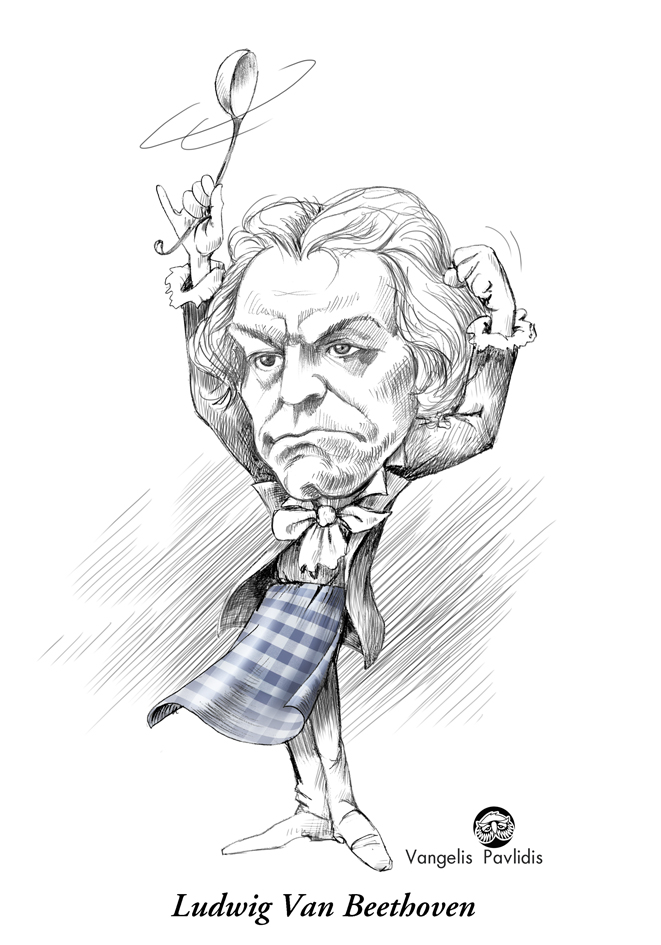
If it was at all possible to weigh a name I would say that the heaviest one in the world of music it would be Ludwig Van Beethoven. And if it was to be pronounced with some music in the background -something like the first bars of the 5th for instance- that name would be of a crushing weight.
Beethoven’s relation to food, because this is what I want to talk about, was kind of strange. Everything mattered to him and and just like his music everything else had to be precisely in place. His coffee for instance, the only indispensable item in his diet, he made himself with sixty (60) beans of freshly roasted coffee per cup which he would count personally. Often, absorbed as he would be with his compositions he would forget to eat, having given orders to his housekeeper not to be disturbed with trivial things such as eating. Another time he he threw a plate of food in the face of a waiter because it wasn’t exactly as he wanted it. The other diners at the restaurant started laughing and soon Beethoven was laughing too. All’s well that ends well. When he was not eating leftovers his favorite dishes were pasta with Parmesan cheese, Danube fish, potatoes, salami of Verona and Stracchino cheese, washed down with Hungarian wine. Every Thursday he looked forward with pleasure to a kind of bread soup cooked like mush. Together with it, ten sizable eggs had to be presented to him on a plate. Before they were stirred into the soup, he first separated and tested them by holding them against the light, then decapitated them with his own hand and sniffed them to see whether they were fresh. Then all storm would brake loose if some among them did not meet his standards of freshness.
Once, in Vienna, he decided to invite some friends to a dinner he was to cook himself. As Ignaz Seyfried relates they found their host in a short evening jacket, a nightcap on his head and his waist girded with a blue kitchen apron and busily engaged at the hearth. After waiting patiently for about an hour and a half the dinner was finally served. The soup was resembled that distributed to beggars by the church, the beef was half done, the vegetables floated in a mixture of grease and water and the roast seemed to have been smoked in the chimney. While the guests found it barely possible to swallow a few morsels, Beethoven full justice to every dish. The polite, albeit somewhat forced applause of his guests put him in such a happy humor that he called himself a “Master Chef”.
So much for food. As it is to be expected Beethoven’s personality was difficult to understand, how else for someone who “wrestled with the gods”. His manners would be at times abrupt and temperamental and his mood could change suddenly. “You give me the impression of being a man with many heads, hearts, souls” told him Haydn. He was an early riser, and from the time he left his bed till dinner the day was devoted to completing at the piano and writing down the compositions which he had previously conceived and elaborated in his sketch-books, or in his head. At such times the noise which he made playing and roaring was something tremendous.
Beethoven is is often thought of as a scowly, fierce man. The truth is his was a hard life, often struggling with poverty. As he once said, “ Life is so lovely, but for me it is poisoned for ever”. A lesser man would have been crushed if he had lost hearing, like him, the most essential, the most vital sense for a composer. But not the great Beethoven. One more reason for us to admire him.






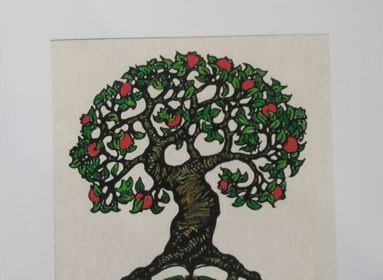
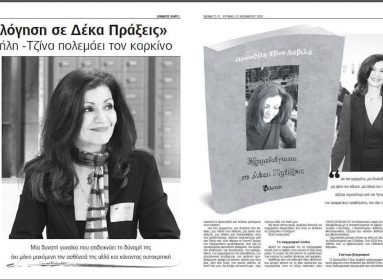















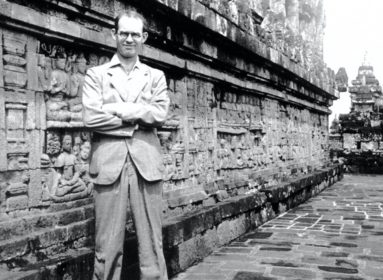
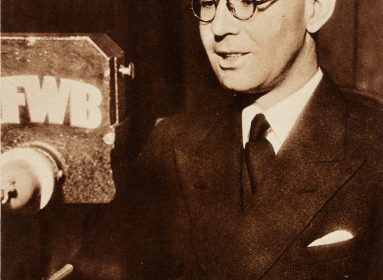


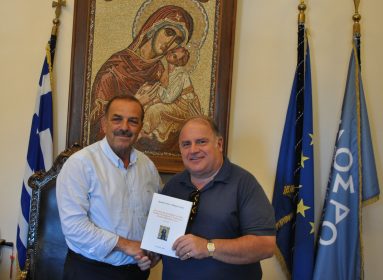

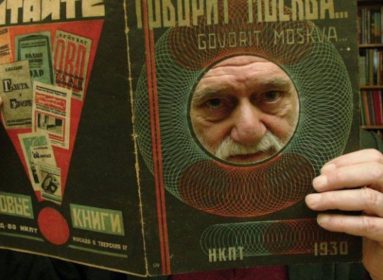

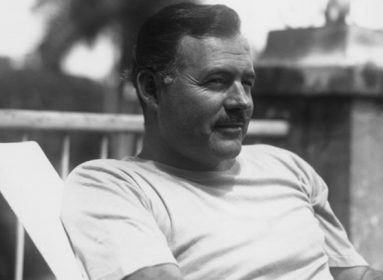
























 Στηρίξτε-Ενισχύστε την iΠόρτα με τη δική σας χορηγία…
Στηρίξτε-Ενισχύστε την iΠόρτα με τη δική σας χορηγία… Το σκίτσο είναι του Βαγγέλη Παυλίδη
Το σκίτσο είναι του Βαγγέλη Παυλίδη
